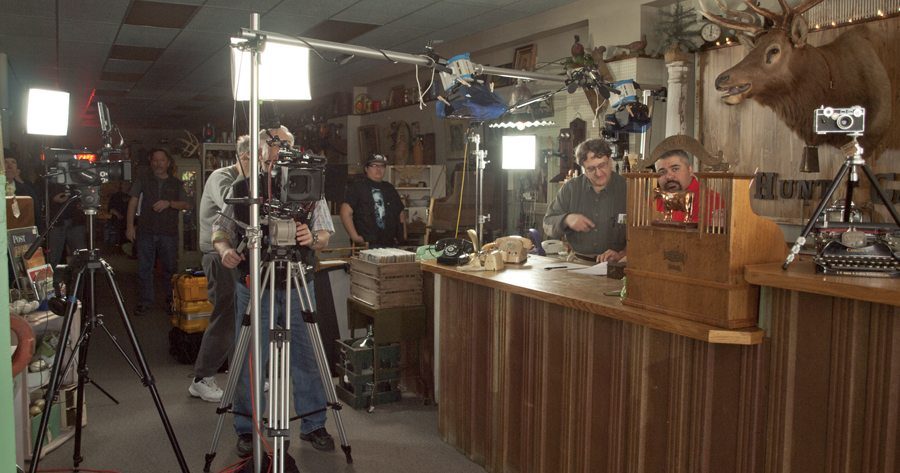
Home » Tri-City’s indie film industry heralding recent surge of growth
Tri-City’s indie film industry heralding recent surge of growth

April 12, 2018
The cameras are rolling on the sets of a growing community of filmmakers shooting their productions right here in Tri-Cities.
Randy LaBarge, a Kennewick-based screenwriter and producer, said rapid advancements in the microminiaturization of technology has led to a surge in independently produced films.
“With the availability of equipment, (movies) can be done really cheap today,” he said. “(It’s) taken it out of the hands of Hollywood and into the hands of aspiring filmmakers.”
Moviemaking isn’t new to the Tri-Cities—hobby groups have come and gone over the past couple of decades. And for the past 10 years, the Tri-Cities has hosted the Tri-Cities International Film Festival, known as TRIFI.
“It’s the best kept secret of Tri-Cities,” said Nat Saenz, a Richland-based director and TRIFI organizer.
Formed by a merging of the annual RadCon Fan Film and Columbia Basin Video festivals in 2008, last year TRIFI received 206 film submissions with budgets of up to $500,000 from 26 countries.
Entries for this year’s festival — set for Oct. 12-14 at the Uptown Theatre in Richland — are already on track to surpass last year’s numbers, said Bryan McGlothlin, a Richland-based director, TRIFI board member and owner of River Road Media production company.
The organization is using a local public relations group for the first time to manage advertising.
“Our goal is to make TRIFI one of the top four film festivals in the Northwest,” Saenz said.
LaBarge, McGlothlin and Saenz agreed that the Tri-City moviemaking industry really started to gain momentum in the past two years.

McGlothlin said part of the uptick in activity can be attributed to the introduction of TRIFI’s 72-hour film challenge.
Participants have just one weekend to make a short film. All writing, shooting and editing must be completed the weekend before the festival. For this year’s competition, the clock starts the evening of Oct. 4 and ends Oct. 7.
The goal is to put the focus on quick decisions and decisive shooting and also forces some to “just shoot it.”
McGlothlin, who has taught the course, Acting for the Camera, at Columbia Basin College for the past seven to eight years said, “There hasn’t been as much enthusiasm (in the course) until the past two or three years.”
He said it’s blossomed as more people got involved in the TRIFI competition. “People realized, ‘Wow, I can make a movie,’ ” he said.
McGlothlin won the 2016 72-hour film challenge with the help of one of his students, Ethan Schotz, on their short film, “11th Commandment.” It was their first year participating.
This year, there will be separate brackets for films produced by high school students and younger, and another for all other entries. The top two finishing films will be shown at TRIFI.
TRIFI also strives to bring in at least one Hollywood professional who’s worked on a big-name production to the festival.
Several people who once worked in Hollywood have since relocated to the Tri-Cities, and some are involved in the local filmmaking community, Saenz said.
Though McGlothlin has been involved in theater for a large part of his life, many of the people involved in the Tri-City film community are retirees pursuing their passions.
LaBarge and Saenz met at Battelle.
LaBarge said he’d always felt writing was his thing. “When I retired, I decided I was going to do what I wanted to do,” he said. He is now a full-time screenwriter.
Saenz said he’d always loved film. “I’ve always been the videographer… But it’s hard when you’re working full time,” he said. “The film community is my passion now.”

The average cost of making a short film in Tri-Cities is $500 to $1,000, according to LaBarge, McGlothlin and Saenz.
“Most of it goes to food,” McGlothlin said. “Everyone is working for you for free, so you better feed them well. Most of the budget is spent on food and props.”
Saenz said the film and theater communities have become closely intertwined over the years.
“We do have the talent here,” he said.
LaBarge said they put out open casting calls across three different area websites. “Every time we do a film, more people turn out,” he said.
One factor that helps keep costs low for Tri-City filmmakers is there are minimal barriers to shooting in public settings. At present, no special permits are required, they said.
“One of the most expensive things is locations … we can’t afford to build sets; it’s cost-prohibitive,” McGlothlin said. He added that it doesn’t hurt to check with the city or local police though, especially if scenes involve the use of public roadways.
“We go to businesses and people’s houses and I’ve never had a business turn me away. It’s amazing how helpful the Tri-Cities community is. … It’s a really wonderful community for shooting independent films,” McGlothlin said.
Independent films rely heavily on the community network to source technical skills, labor, equipment and services to bring a movie to completion.
“The film industry thrives on connections and interpersonal relationships,” LaBarge said.
For his latest project, “Strowger’s Revenge,” a short film directed by Saenz, the production company, 2047 Productions, had to overcome several challenges.
The subject of the film is a haunted telephone dating back to the late 1800s. The cost to buy an actual Strowger Candlestick phone would have cost almost $10,000, and renting one would still have cost up to $1,000 per day—well outside the film’s budget.
But one of the crew members had a 3D printer and was able to produce three replica phones for a fraction of the cost.
“Strowger’s Revenge” also required the use of a green screen to incorporate some ghostly apparitions during key scenes.
Another member of the crew, longtime KVEW-TV cameraman Scott Armstrong, runs a photography studio out of his converted garage and was able to capture this footage.
“Filmmaking is the greatest collaborative effort,” LaBarge said. “It takes all of these people with their specialties to create something that no one person could create.”
2047 Productions plans to have the final cut of “Strowger’s Revenge” ready by June, in time to hit the summer film festival circuit.
Saenz expects to start working on the production of a new film in the fall. He said they’re always open to new scripts.
“I like independent film better than Hollywood,” he said. “It’s original storytelling. … It’s made for passion; we’re not worried about making the buck.”
Those interested in becoming involved in the Tri-City film community can attend a monthly networking meeting held at 5 p.m. the last Thursday of each month at the Towne Crier in Richland.
Local News
KEYWORDS april 2018




